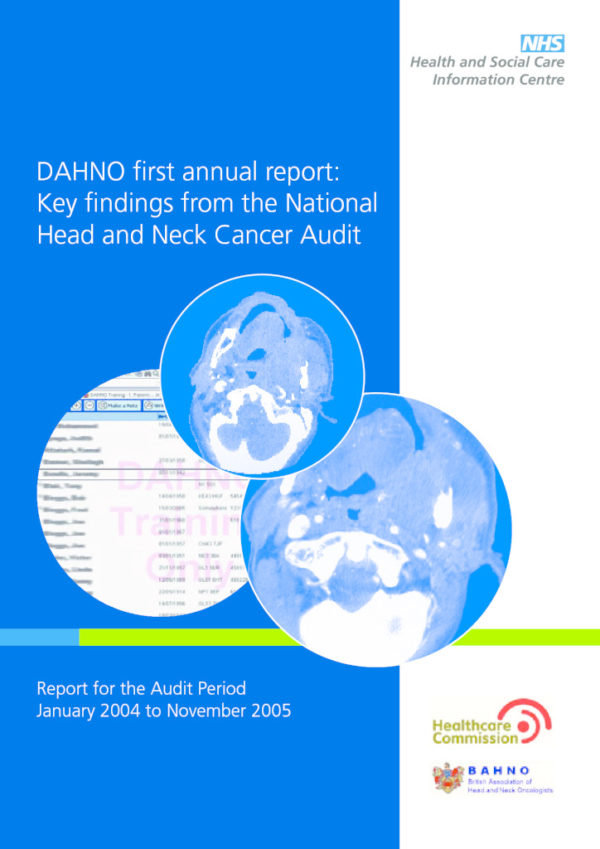National Head and Neck Cancer Audit
The head and neck cancer audit was commissioned in England and Wales from 2005 to 2017 as a topic in the centrally-funded National Clinical Audit and Patient Outcomes Programme (NCAPOP). The most common sites for head and neck cancer are the larynx (throat) and oral cavity (mouth). Head and neck cancer treatment requires a wide range of expertise, and treatment is usually discussed and agreed by multidisciplinary teams (MDTs). The aim of this audit was to produce meaningful results that act as a vehicle to improve delivery of care to patients.
The audit was delivered for many years by NHS Digital who ran the first head and neck audit DAHNO, and more recently by Saving Faces – The Facial Surgery Research Foundation (SF) who ran the new Head and Neck Audit (HANA) within the NCAPOP between July 2015 and June 2017, and continue to do so subsequently under different funding arrangements (see below).
From March 2017, the commissioning arrangements for the National Head and Neck Cancer Audit (HANA) changed. HANA is continuing as a national audit under new funding arrangements, and due to this change, it is no longer part of the National Clinical Audit and Patient Outcomes Programme (NCAPOP). This is not the first audit to undergo such a change in status: the national Inflammatory Bowel Disease (IBD) audit also left the NCAPOP in 2017 and transitioned to sustainable funding within the new IBD Registry.
Auditing the topic of head and neck cancer has always posed particular design and delivery challenges because of the complexities of pathologies and patient pathways that are covered. This has been reflected in the difficulties experienced firstly by NHS Digital who ran the first head and neck audit DAHNO, and by Saving Faces.
It took longer than SF and HQIP expected for SF to receive the historic DAHNO data collected at NHS Digital before 2014. This delayed the production of the Clinical Outcomes Publication (COP) report on this data. In addition, the establishment and roll out of the new audit, HANA, did not meet the expectations agreed at the outset of the contract with HQIP. These issues resulted in the cessation of central funding of HANA from June 2017.
HQIP and the NCAPOP funders recognised that SF and HANA’s clinical leadership and engagement with local MDTs had been strong and that through their efforts there had been considerable participation by clinicians around the country. HQIP and the funders were pleased that Saving Faces offered the sustainable funding to continue developing and delivering the audit building on the investment received from NCAPOP. HQIP provided expertise and support during a brief transition period over the spring and early summer of 2017.
From June 2017, HQIP has continued to offer the same support to Saving Faces and HANA as it provides to other independently-run national audits, sharing the joint aim of providing the NHS with a high-quality audit effective in improving outcomes for these patients for whom the impact of head and neck cancer can be so profound.
Further information about the Head and Neck Cancer Audit (HANA) is available on the Saving Faces website.


